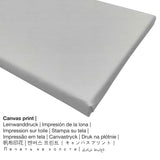Master of Flora - The Birth of Cupid - fine art print
Tax included. Shipping calculated at checkout.
Which kind of art product do we offer?
The work of art was created by Master of Flora. The version of the painting had the following size: Overall 42 1/2 x 51 3/8 in (108 x 130,5 cm), including added strip of 3 1/2 in (8,9 cm) at top and was painted on the medium oil on wood. Nowadays, this artpiece is in the the The Metropolitan Museum of Art's digital art collection, which is one of the world's largest and finest art museums, which includes more than two million works of art spanning five thousand years of world culture, from prehistory to the present and from every part of the globe.. With courtesy of - The Metropolitan Museum of Art, New York, Rogers Fund, 1941 (license: public domain). : Rogers Fund, 1941. Further, the alignment of the digital reproduction is landscape with a ratio of 1.2 : 1, which implies that the length is 20% longer than the width. The painter Master of Flora was an artist, whose art style can be attributed mainly to Mannerism. The Italian artist was born in the year 1550 and passed away at the age of 49 in the year 1599.
Which kind of materials can I pick?
The product dropdown menu gives you the opportunity to select your individual material and size. We allow you to pick your favorite size and material among the following product individualization options:
- Poster (canvas material): Our poster is a UV printed cotton canvas with a fine surface texture. It is best designed for putting your art replica with the help of a personal frame. Please note, that depending on the size of the poster print we add a white margin of something between 2 - 6cm round about the painting, which facilitates the framing with your custom frame.
- Metal (aluminium dibond print): These are metal prints on aluminium dibond with a true depth effect. A direct Direct Print on Aluminum Dibond is the perfect start to fine art replicas with aluminum. The bright and white parts of the artpiece shimmer with a silk gloss but without glare. Colors are vivid and luminous, the fine details of the print appear crisp, and you can notice the matte appearance of the surface. The print on aluminium is the most popular entry-level product and is an extremely stylish way to showcase art reproductions, since it draws focus on the artwork.
- The acrylic glass print (with real glass coating): An acrylic glass print, which is sometimes referenced as a plexiglass print, will transform the artwork into amazing wall decoration. Further, the acrylic print is a great alternative option to dibond or canvas fine art replicas. The artwork is being custom-made with state-of-the-art UV direct printing technology. With an acrylic glass art print contrasts plus painting details will be exposed thanks to the delicate gradation in the picture.
- Canvas print: A canvas print is a printed cotton canvas stretched on a wooden frame. The great advantage of canvas prints is that they are relatively low in weight, which implies that it is quite simple to hang up the Canvas print without the use of any wall-mounts. Canvas prints are suitable for all kinds of walls.
Legal disclaimer: We try our best in order to describe our art products in as much detail as we can and to display them visually in our shop. However, the tone of the printing material, as well as the print result can differ marginally from the representation on your device's screen. Depending on your settings of your screen and the quality of the surface, not all colors will be printed one hundret percent realistically. Considering that the art prints are processed and printed manually, there might as well be slight variations in the size and exact position of the motif.
Structured product information
| Article categorization: | art copy |
| Reproduction method: | digital reproduction |
| Production technique: | UV direct printing |
| Provenance: | made in Germany |
| Type of stock: | production on demand |
| Product usage: | art reproduction gallery, art collection (reproductions) |
| Alignment: | landscape alignment |
| Image ratio: | length to width 1.2 : 1 |
| Implication of image aspect ratio: | the length is 20% longer than the width |
| Product material variants: | metal print (aluminium dibond), acrylic glass print (with real glass coating), canvas print, poster print (canvas paper) |
| Canvas print (canvas on stretcher frame) sizes: | 60x50cm - 24x20", 120x100cm - 47x39", 180x150cm - 71x59" |
| Acrylic glass print (with real glass coating) size variants: | 60x50cm - 24x20", 120x100cm - 47x39", 180x150cm - 71x59" |
| Poster print (canvas paper) options: | 60x50cm - 24x20", 120x100cm - 47x39" |
| Aluminium dibond print (aluminium material) size options: | 60x50cm - 24x20", 120x100cm - 47x39" |
| Picture frame: | unframed product |
Structured table of the artpiece
| Name of the painting: | "The Birth of Cupid" |
| Artwork classification: | painting |
| Original medium of artwork: | oil on wood |
| Original size: | Overall 42 1/2 x 51 3/8 in (108 x 130,5 cm), including added strip of 3 1/2 in (8,9 cm) at top |
| Museum / location: | The Metropolitan Museum of Art |
| Museum location: | New York City, New York, United States of America |
| Website: | The Metropolitan Museum of Art |
| License: | public domain |
| Courtesy of: | The Metropolitan Museum of Art, New York, Rogers Fund, 1941 |
| Artwork creditline: | Rogers Fund, 1941 |
Contextual artist metadata
| Artist name: | Master of Flora |
| Artist gender: | male |
| Nationality of artist: | Italian |
| Jobs of the artist: | painter |
| Country: | Italy |
| Styles: | Mannerism |
| Died aged: | 49 years |
| Birth year: | 1550 |
| Year of death: | 1599 |
© Copyright - intellectual property of - Artprinta (www.artprinta.com)
Supplemental information from The Metropolitan Museum of Art (© Copyright - The Metropolitan Museum of Art - The Metropolitan Museum of Art)
This painting appears to depict the birth of Cupid, with attendants ministering to his mother, Venus. The lively, decorative composition is typical of French artists working in the style developed by the Italians at the château de Fontainebleau, such as Rosso Fiorentino of Florence and Primaticcio and Niccolo dell Abate of Bologna. The frame is sixteenth-century Italian.














